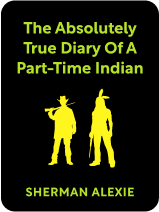

This article is an excerpt from the Shortform summary of "The Absolutely True Diary of a Part-Time Indian" by Sherman Alexie. Shortform has the world's best summaries of books you should be reading.
Like this article? Sign up for a free trial here .
What is the chapter “Rowdy Gives Me Advice About Love” in the book The Absolutely True Diary of a Part-Time Indian about?
“Rowdy Gives Me Advice About Love” is the chapter where Junior approaches Rowdy for advice on dating a girl from his new school named Penelope. Even though they’re still not on good terms, Junior wants his best friend’s advice.
Keep reading for a summary of “Rowdy Gives Me Advice About Love.”
Rowdy Gives Me Advice About Love
In the chapter “Rowdy Gives Me Advice About Love,” Junior reaches out to Rowdy about a girl named Penelope. Rowdy’s response isn’t helpful, but Junior is happy to have made contact.
Seeking Advice
Junior doesn’t know how to deal with his feelings for Penelope, so he emails Rowdy, even though he doesn’t expect to hear back. To Junior, Rowdy’s still his best friend, even though Rowdy hates him. Junior tells Rowdy he’s in love with a girl who’s white and doesn’t know what to do. Rowdy responds a few minutes later, telling Junior he’s just another Indian “treating white women like bowling trophies.”
Junior doesn’t find this advice helpful, so he turns to Gordy, asking how to make a white girl love him. Being Gordy, he decides to do some research. Days later, Gordy delivers his report: He has found an article on a young white woman whose disappearance in Mexico generated a lot of media attention. The same article points out that hundreds of Mexican girls have disappeared from the same area, but people don’t really pay attention to those disappearances. The general population cares more about white girls than any other group of people.
Junior doesn’t get how any of this applies to him. Gordy clarifies, bluntly telling Junior that it means he’s a “racist asshole like everybody else,” essentially what Rowdy said earlier in the chapter “Rowdy Gives Me Advice About Love.”
Pancakes with the Popular Kids
After Junior attends the Winter formal, he thinks he has successfully hidden his poverty, but then Roger, the big guy he punched, and some other popular students decide it would be the coolest thing in the world to drive to a Spokane diner for pancakes. Because Penelope is popular, she and Junior get an invite as well, even though they’re only freshmen. This is where the chapter “Rowdy Gives Me Advice About Love” gets complicated for Junior, even though things are going well for Penelope.
Junior can’t pay for pancakes. But knowing that the jig is almost up, he throws caution to the wind and orders not only pancakes for himself and Penelope, but also toast, fries, orange juice, hot chocolate, and coffee.
Terrified at the prospect of being exposed, Junior feels sick and goes to the restrooms half-way through the meal. Roger comes in and hears Junior retching. Junior tells him that he’s feeling sick because he forgot his wallet at home and can’t pay for the meal. Roger tells him he should have said something sooner and lends him $40. Junior is grateful, and he can’t imagine what it must be like to be able to casually hand over that much money to a near-stranger.
At 3 a.m., Roger drives Junior and Penelope back to the school. Junior tells them his dad is on his way to pick him up, which is clearly not true. Junior and Penelope step out of the car for a private moment and Penelope tells Junior she knows Roger lent him money. She aks Junior if he’s poor. Junior’s tired of lying and tells her that yes, he’s poor. In response, Penelope kisses him on the cheek. She then asks if his dad is really coming to pick him up. At first, Junior insists that he is, but finally admits that he usually walks home or hitchhikes. The thought of Junior walking home makes Penelope cry, and before Junior can stop her, she asks Roger to drive Junior home. This is the first of many nights that Roger will drive Junior home from school.
Junior realizes that while he’s been preoccupied with Penelope’s looks, she’s actually been concerned about him. This realization makes him feel shallow. Junior sees that when you’re honest with people, those people can turn out to be pretty incredible. It turns out that Junior learns something on his own in the chapter “Rowdy Gives Me Advice About Love”
Not long after, Junior’s sister Mary writes to him to tell him that she and her husband have moved into a trailer, the most beautiful home ever. She still can’t get a job because she lacks experience, but she’s started to write a memoir. Mary is happy for the first time in a long time. Her memoir is about the nature of hope. She’s thinking of calling it “How to Run Away From Your House and Find Your Home
The chapter “Rowdy Gives Me Advice About Love” marks another change in Rowdy and Junior’s friendship. They don’t reconcile yet, but Junior thinks the contact is positive.

———End of Preview———
Like what you just read? Read the rest of the world's best summary of Sherman Alexie's "The Absolutely True Diary of a Part-Time Indian" at Shortform .
Here's what you'll find in our full The Absolutely True Diary of a Part-Time Indian summary :
- How Junior gets split between two worlds when he goes to a mostly white school
- How Junior overcomes being an outsider to being part of welcoming social circles
- The tragedies of alcoholism and poverty that leave Junior with renewed strength






